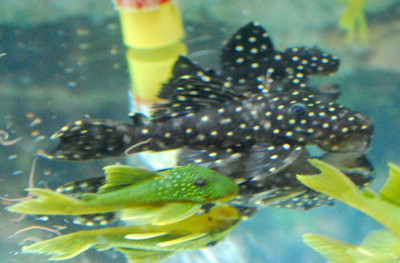The L200 Plecostomus
Posted by Max Gandara on on 24th Oct 2023
The L200 Plecostomus, scientifically known as Baryancistrus demantoides,
is a striking and captivating species of freshwater fish that has
become a popular choice among aquarium enthusiasts. This unique member
of the Loricariidae family is often sought after for its striking
appearance, peaceful disposition, and its proficiency as an algae eater.
In this article, we will delve into the world of the L200 Plecostomus,
exploring its natural habitat, physical characteristics, care
requirements, and its role in the world of aquaria.
The L200 Plecostomus hails from South America, specifically from the
Amazon River Basin. These fish are found in the clear, slow-moving
waters of the Rio Orinoco in Venezuela. In their natural habitat, they
inhabit rocky crevices and caves, which provide them with shelter and
protection. The water in these regions is typically slightly acidic and
ranges from 75°F to 82°F (24°C to 28°C). To successfully keep L200
Plecostomus in an aquarium, it's important to replicate these conditions
to the best of your ability.
The L200 Plecostomus boasts a distinctive appearance that sets it apart
from other fish species. They have a compact, elongated body covered in
armor-like plates. These plates, or scutes, run along their sides and
serve as protection against predators. Their coloration is a standout
feature, with dark green or brownish-black tones accented by vibrant,
contrasting bands and spots.
One of the most striking features of L200 Plecos is their striking,
vibrant green eyes, which are a testament to their unique charm. These
fish have a specially adapted mouth that allows them to scrape algae and
biofilm off hard surfaces, which is a vital feature for their role in
aquariums.
Caring for L200 Plecostomus can be a rewarding experience, but it's
essential to meet their specific care requirements to ensure their
well-being. Here are some key considerations:
1. Tank Size: These fish require a reasonably spacious tank due to their
size and activity level. A tank with a capacity of 30 gallons or more
is recommended for a single L200 Plecostomus.
2. Water Parameters: Maintaining water conditions close to their natural
habitat is crucial. Keep the water temperature between 75°F to 82°F and
maintain a slightly acidic pH level (around 6.5 to 7.5). Adequate
filtration is essential to keep the water clean and well-oxygenated.
3. Hiding Places: L200 Plecos are known for their secretive nature.
Provide plenty of hiding spots, such as caves or driftwood, where they
can take refuge and feel secure.
4. Diet: These fish are herbivores and primarily feed on algae and
biofilm. However, supplement their diet with high-quality sinking
pellets and fresh vegetables like zucchini, cucumber, and spinach.
5. Tank Mates: L200 Plecostomus is generally peaceful and can coexist
with various community fish species. However, avoid keeping them with
aggressive or larger tank mates that might harass or compete with them
for food.
6. Maintenance: Regular water changes and tank maintenance are essential
to ensure a clean and stable environment for your L200 Plecostomus.
Role in Aquariums
The L200 Plecostomus is a fantastic addition to freshwater aquariums for several reasons:
1. Algae Control: These fish are excellent algae eaters and can help
keep your aquarium glass and decorations free from excessive algae
growth.
2. Aesthetics: Their striking appearance and unique green eyes make them an eye-catching addition to any tank.
3. Peaceful Nature: L200 Plecos are known for their calm and non-aggressive demeanor, making them ideal for community tanks.
The L200 Plecostomus, with its alluring appearance and practical role in
maintaining a clean aquarium, is a sought-after species among fish
enthusiasts. By providing them with the appropriate care and maintaining
the right tank conditions, you can enjoy the beauty and utility of
these remarkable fish in your own freshwater aquarium.

